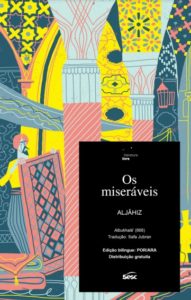São Paulo – Literary works from around the world are being translated into Brazilian Portuguese and made available online free of charge. This month saw the Literatura Livre (Free Literature) project release ‘The Book of Misers’ by Al-Jâhiz. Originally written in Arabic, the book was translated by Safa Jubran, a professor of Arabic Language and Literature at the Department of Oriental Languages of the Faculty of Philosophy, Language and Human Sciences (FFLCH) at the University of São Paulo (USP). The project is an initiative of the São Paulo chapter of the Social Service for Commerce (Sesc-SP) and Instituto Mojo de Comunicação Intercultural. Pictured above is one of the book’s illustrations.
The works are available online for free download from the project’s website. Already available are eleven public domain texts from peoples the project managers believe have helped inform Brazilian culture. Some titles had never been released before, and all are available in translated form and in the original version.
All translations were made by USP professors. Two other recent releases are ‘The Chronicles of Japan,’ by Prince Toneri and Ō-no-Yassumaro, and ‘The Leviathan’ by Joseph Roth.
The Book of Misers
‘The Book of Misers’ (from the Arabic, Kitâb Al-Bukhalâ) is a collection of stories about greedy, avaricious people. Some of the anecdotes were witnessed by Al Jâhiz himself, and others he heard from other people. Considered one of the seminal works in the Arab cultural canon, the text was written in the year 868.

The book’s Iraqi author, Abu-Uthmân Amr bin-Bahr Alkinâni, is better known for the nickname Al Jâhiz, a reference to his wide eyes. He also wrote ‘The Book of Animals’ (Kitâb Al-Hayawân), the first piece on zoology in Arabic, and “The Book of Eloquence and Oratory” (Kitâb Al-Bayân Wat-tabyîn), which laid the foundation of Arabic rhetoric and language philosophy.
In translating ‘The Book of Misers’ into Portuguese, Jubran selected and adapted some of the accounts featured in this medieval Arabic classic. “Each of the anecdotes or stories were translated from a text ‘resultant’ from a comparison of multiple existing Arabic versions of the text, including the one featured in this edition, which is itself a ‘simplified’ version of the original,’ Jubran told newspaper Jornal da USP about the Arabic text available alongside the translation.
In a bid to make the language and content more accessible, the adaptations strive to maintain the historical settings in the 9th-century original. Jubran notes that some of the anecdotes have been featured in translated works before, albeit in simplified manner, a case in point being ‘As Mais Belas Páginas da Literatura Árabe,’ by Mansour Challita. Four of the stories were also translated by FFLCH professor Mamede Jarouche in ‘Histórias para Ler sem Pressa.’
-
-
- Here’s more on the USP: ‘An Arab world within the University of São Paulo
-
Translated by Gabriel Pomerancblum




